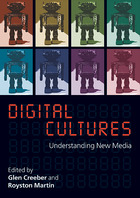Marshall McLuhan: The Gutenberg Galaxy: The Making of Typographic Man (1962–) [EN, BR-PT, CZ]
Filed under book | Tags: · global village, literacy, mass media, movable type, print, renaissance, scholasticism, technology, typography, writing

“In this book, McLuhan analyzes the effects of mass media, especially the printing press, on European culture and human consciousness. It popularized the term global village, which refers to the idea that mass communication allows a village-like mindset to apply to the entire world; and Gutenberg Galaxy, which we may regard today to refer to the accumulated body of recorded works of human art and knowledge, especially books.
McLuhan studies the emergence of what he calls Gutenberg Man, the subject produced by the change of consciousness wrought by the advent of the printed book. Apropos of his axiom, “The medium is the message,” McLuhan argues that technologies are not simply inventions which people employ but are the means by which people are re-invented. The invention of movable type was the decisive moment in the change from a culture in which all the senses partook of a common interplay to a tyranny of the visual. He also argued that the development of the printing press led to the creation of nationalism, dualism, domination of rationalism, automatisation of scientific research, uniformation and standardisation of culture and alienation of individuals.”
Publisher University of Toronto Press, 1962
ISBN 0802060412, 9780802060419
300 pages
The Gutenberg Galaxy (English, updated on 2021-1-6)
A galáxia de Gutenberg (BR-Portuguese, trans. Leônidas Gontigo de Carvalho and Anísio Teixeira, 1972, added on 2017-3-12)
Gutenbergova galaxie (Czech, 2000, added on 2017-3-12)
Glen Creeber, Royston Martin (eds.): Digital Cultures: Understanding New Media (2008)
Filed under book | Tags: · digital cinema, digital divide, facebook, internet, mass media, media studies 2.0, new media, public broadcasting, public sphere, video games, wikipedia, youtube

From Facebook to the iPhone, from YouTube to Wikipedia, from Grand Theft Auto to Second Life – this book explores new media?s most important issues and debates in an accessible and engaging text for newcomers to the field.
With technological change continuing to unfold at an incredible rate, Digital Cultures rounds-up major events in the media?s recent past to help develop a clear understanding of the theoretical and practical debates that surround this emerging discipline. It addresses issues such as:
* What is new media?
* How is new media changing our lives?
* Is new media having a positive or negative effect on culture and human communication?
Each chapter contains case studies which provide an interesting and lively balance between the well-trodden and the newly emerging themes in the field.
Topics covered include digital television, digital cinema, gaming, digital democracy, mobile phones, the World Wide Web, digital news, online social networking, music and multimedia, virtual communities and the digital divide.
Digital Cultures is an essential introductory guide for all media and communication studies students, as well as those with a general interest in new media and its impact on the world around us.
Publisher Open University Press, 2008
ISBN 0335221971, 9780335221974
Length 205 pages
Brett Christophers: Envisioning Media Power: On Capital and Geographies of Television (2009)
Filed under book | Tags: · geography, mass media, political economy, television

Envisioning Media Power develops an original geographical perspective on the nature and exercise of power in the international television economy. It uses theories of political economy as the basis for a comparative empirical examination of the UK and New Zealand television markets, while closely considering these markets’ respective relationships with the US market and its globally-influential media corporations. In fleshing out this geographical perspective, the book critically addresses the power to produce, reproduce, and extract profit from territorialized media markets. To understand such powers, the book examines processes of creation and dissemination of industry knowledge, structures of industry governance, and the locational characteristics of television’s operational economy.
Through its rigorous and creative combination of conceptual insights with empirical substance, Envisioning Media Power both illuminates the fabric of television’s international space economy, and ultimately offers a unique theoretic argument – suggesting that power, knowledge and geography are inseparable not only from one another, but from the process of accumulation of media capital.
G – Reference, Information and Interdisciplinary Subjects Series
Publisher Lexington Books, 2009
ISBN 0739123440, 9780739123447
Length 467 pages

